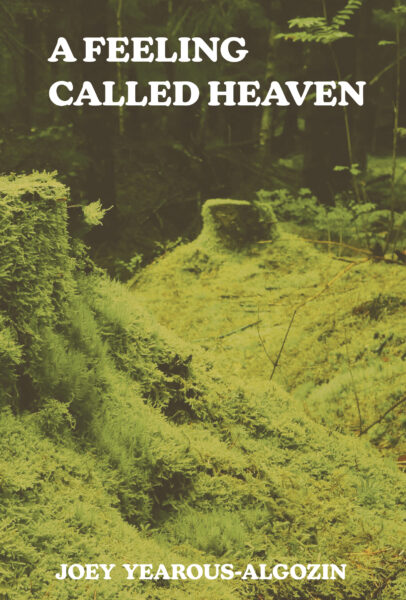Joey Yearous-Algozin grants us the gift of the very emotion his book title states, A Feeling Called Heaven. He explores the end of the world matter-of-factly, with straightforward acceptance, patience, and a certain degree of excitement. Throughout this forthright poetry, we are inspired by the realization that perhaps heaven is being on this earth together. We spend our lives, on a basic level, coming together and leaving each other, and all of our time can be measured by either presence or absence. It is in our transitions and ghostly shifts that we are most human; disappearing is a natural thing to do.
It is humbling to remember that the world began without us and does not need us. We will arguably be leaving the world worse than how we found it, but our planet has undergone countless changes and evolutions. We are fragile, nervous, fluttering creatures, existing for a relatively short amount of time in the grand scheme of things, just a blink of the earth’s eyes, a scar across its surface. Despite this, our lives are not meaningless. If all we do with our time here is ease some small amount of suffering, that is enough:
“for there’s nothing to be done now / but love / and embrace the silence.”
There should be some happiness, not desolation, in the awareness of how transient our lives are. The concrete fact that death is inevitable somehow makes it less sad. The future end should actually be less terrifying than our present days, because we know what to expect, up to a point. This poetry does not contemplate the specifics so much as it places us in a sequential timeline. Maybe the world won’t smell so much like garbage once we’re gone, but on the other hand, maybe there will just be plastic debris in abandoned parking lots, the remnants of broken dishes in unused sinks. Whatever the next stage looks like, we will not be around to see it, although we have helped shape it.
The reader is continuously addressed like the poem is a gentle conversation, the speaker saying, “I want you to remember,” and “I wanted to say something directly to you / to address you / as though I were holding your hand,” and there is a long guided meditation at the end. We are instructed to focus on our safety and the image of the sun, to feel individual raindrops on our bodies. It is an intimate comfort, to visualize ourselves so reverently and also know that we are merely a single part of nature. Everything on our planet is fantastic, as it always has been and always will be.
Sometimes we may find ourselves yearning for something other than what we have, some universe aside from this one, but Yearous-Algozin reminds us that this is all there is. At the end of the world, we have nothing but the certainty that we are all facing this together. This book does not focus on any possible world that may lie beyond ours. We only focus on the journey, the inevitable arrival. We stop in suspension on the doorstep, our fists readily poised to knock on the door to the end.
“A Feeling Called Heaven” is a logical reminder of our looming extinction, but with a peaceful sense of community, not a panic. If ever you begin to feel uneasy about a sudden apocalypse or slow decline, this steady poetic heartbeat will calm your nerves and almost make you look forward to our collective harmonious finale.
(Nightboat Books, August 2021)
Bethany Crawford has studied both health science and creative writing, and currently works as a medical scribe in Alabama. She was once the poetry editor of Green Blotter Literary Magazine and read submissions for Spark: A Creative Anthology and Zetetic: A Record of Unusual Inquiry. She rants and shares photos of her ragdoll cats on Twitter @bethanylmary.
